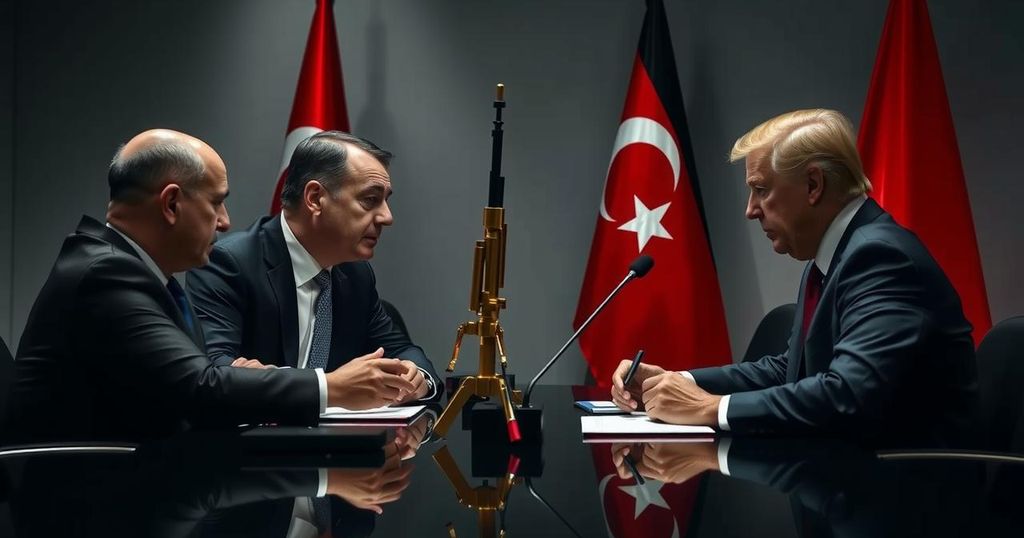Germany and Turkey Engage in Arms Supply Discussions Amid Middle Eastern Conflicts

During his Istanbul visit, German Chancellor Olaf Scholz and Turkish President Recep Tayyip Erdoğan discussed arms supplies, including the early stages of a Eurofighter jet project. Erdoğan condemned Israel’s actions in Gaza, accusing it of genocide, while Scholz stressed the need for humanitarian recognition on both sides. The talks also touched upon the potential for de-escalation in Lebanon. This diplomatic engagement follows significant tensions concerning asylum policies in Europe.
On October 19, 2024, during his visit to Istanbul, German Chancellor Olaf Scholz engaged in discussions with Turkish President Recep Tayyip Erdoğan regarding arms supplies and ongoing regional conflicts, specifically pertaining to Israel’s actions in Gaza and Lebanon. Chancellor Scholz updated the press on the potential supply of Eurofighter jets to Turkey, a project that is currently being led by Britain and is still in its initial phase. “It is something that will continue to develop, but is now being driven forward from there (Britain),” he remarked at a joint press conference. This visit comes on the heels of an EU summit centered on migration, amidst a backdrop of intense national discourse over stricter asylum policies and increased deportations. As the two leaders commemorated a century of diplomatic relations, Erdoğan expressed a desire to resolve previous issues in defense cooperation. “We wish to leave behind some of the difficulties experienced in the past in the supply of defence industry products and develop our cooperation,” he stated. During the talks, Erdoğan accused Israel of genocide concerning its military operations in the Gaza Strip, calling for heightened international intervention to facilitate humanitarian aid in the region. In response, Chancellor Scholz refrained from endorsing Erdoğan’s characterization, emphasizing the need to recognize civilian casualties on both sides. He acknowledged the divergences in their perspectives on Israel, stating, “It is no secret that we also have different views on Israel.” In light of the escalating tensions in Lebanon, Scholz noted the potential for de-escalation should a United Nations resolution be enacted, which demands the withdrawal of the Hezbollah militia from the border area. Chancellor Scholz arrived in Istanbul following a meeting with U.S. President Joe Biden and the leaders of France and Britain in Berlin.
The discussions between Chancellor Scholz and President Erdoğan occur against a complex backdrop of shifting geopolitical alliances and tensions in the Middle East. Turkey has historically sought to bolster its defense capabilities and seeks greater cooperation with European nations in arms procurement. The Eurofighter jet project reflects this ambition, although its progress has been notably slow. On the other hand, the humanitarian crisis unfolding in Gaza is a significant issue in current international relations, prompting leaders like Erdoğan to call for accountability and humanitarian considerations. The focus on Lebanon and its regional stability also highlights continued concerns over Iranian influence through groups like Hezbollah.
Chancellor Olaf Scholz’s visit to Turkey signified an effort to enhance bilateral defense cooperation while addressing pressing regional conflicts. The discourse highlighted the importance of international recognition of humanitarian crises and the complexities surrounding arms supplies amidst divergent views on Israel. As both leaders aim to advance their nations’ interests, the unfolding situation in the Middle East remains a crucial point of concern that merits careful diplomatic engagement.
Original Source: www.politico.eu








